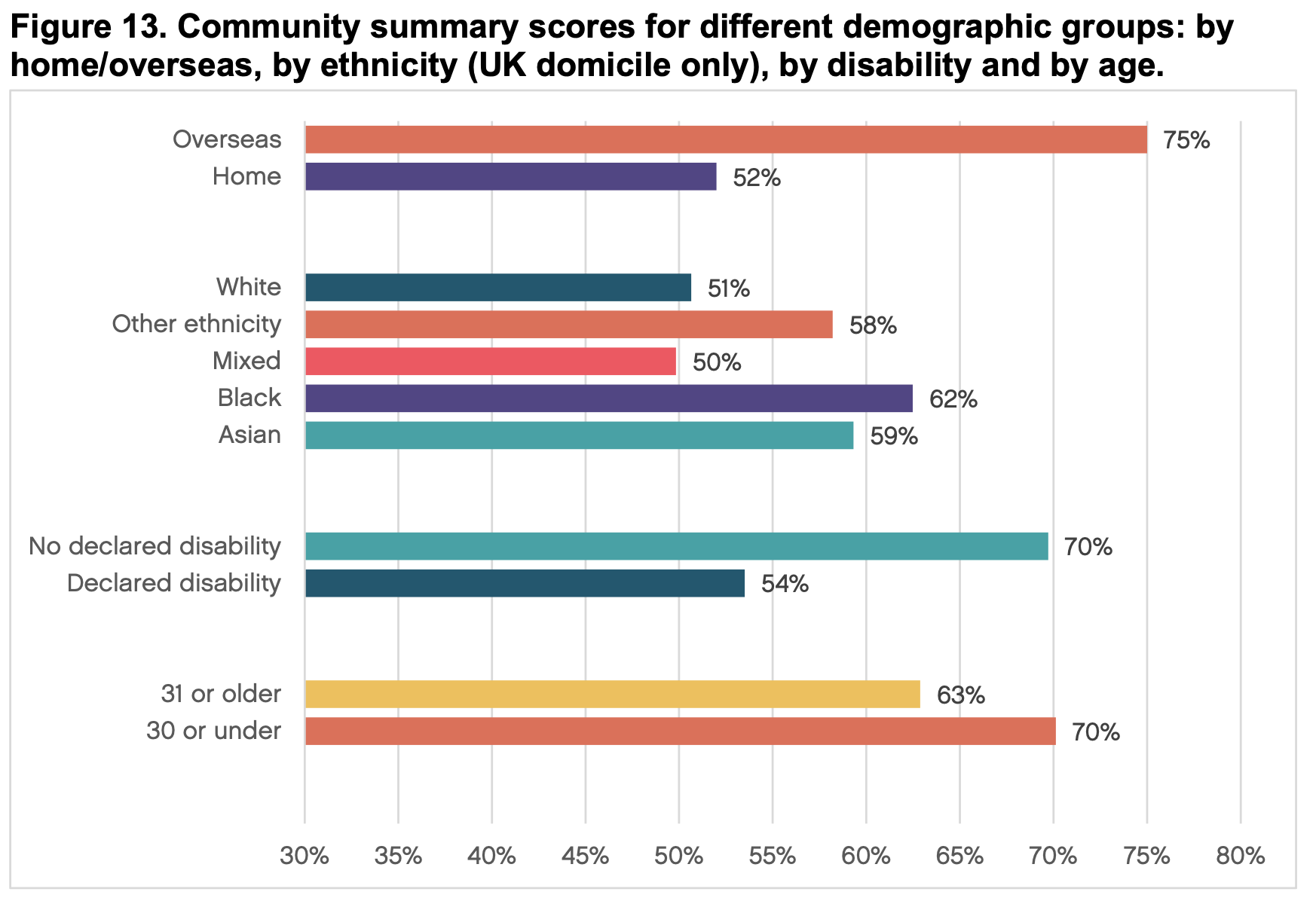Another year, another PTES
Mack Marshall is Wonkhe SUs’ Community and Policy Officer
Tags
While satisfaction levels stay high at 84 per cent amongst respondents, community continues to bubble away as a challenge for the postgraduate taught student experience and the disparities get starker when considering disabled students’ responses.
When asked if students feel part of a community, feel a sense of belonging and if there are sufficient opportunities to interact with other postgraduate students, 52 per cent of home students responded positively versus 75 per cent of overseas students.
For those with a declared disability, that figure is just 54 per cent compared to 70 per cent for respondents with no declared disability.
These disparities based on demographics remind us of the complexity of the postgraduate student experience and require institutions to do some thinking on how and why these gaps are emerging.
The PTES saw its highest ever number of participants in 2024, including 98,311 responses across 108 participating institutions. The survey ran for at least three weeks between February and mid June, asking students about teaching and learning, engagement, and assessment and feedback. It also includes compulsory questions on “community” – something that the undergraduate-focused National Student Survey no longer asks about.
Its respondents represent around 13 per cent of the postgraduate taught student (PGT) population in the UK.
In terms of satisfaction, 84 per cent agreed that they were satisfied with the quality of their course – there were six percentage points between home and overseas students. Disability offered a notable disparity where those with a declared disability reporting 77 per cent satisfaction in comparison to 86 per cent for respondents with no known disability.
In terms of demographics, students with a disability have taken the longest to recover to pre-pandemic levels, and satisfaction levels are currently lower than they were ten years ago – although only by one percentage point.
The PTES community questions offer insight into how many PGT students feel part of a community and feel like they belong on their course. With a shorter period of study, compared to undergraduates, the opportunities for belonging appear more limited but the results from this year’s survey continue to press that it remains a priority for PGTs.
Some 64 per cent of respondents reported there were sufficient opportunities to interact with other PGTs, 70 per cent felt a sense of belonging, and 69 per cent felt part of a community of PGTs.
However, a sense of community is experienced differently depending on demographics.
Community satisfaction for disabled students was 54 per cent, for home students overall it was even lower at 52 per cent. When asked what would improve their experience, community was mentioned both positively and negatively for the impact it has on their experience in open text comments.
I wanted a better sense of community, the set up of the course didn’t allow for much discussion with those around you.

In terms of retention, 16 per cent of respondents had considered leaving their course with balancing studies and other commitments ranked highest as a reason to leave – 21 per cent – followed by financial difficulties. It would be wise to assume the two are connected.
Disabled student respondents were more likely to consider leaving than their peers who did not declare a disability. Here the most common reason was mental/emotional health problems. Accommodations that were, or were not, made for their disability were listed as one of the main things that needed to be improved.
When it came to the impact of the cost of living crisis, 65 per cent felt they had concerns it was having a negative impact on their studies by either “a little” or “a lot,” mirroring the wider Student Academic Experience Survey findings from May 2024. Disabled students were also disproportionately affected with 43 per cent reporting it was negatively impacting their studies.
The report goes on to make recommendations for the sector around community building, assessment fairness and postgraduate study with a disability.
What is clear is that the challenges presented by the cost of living remains a crisis for postgraduate students, even though it is not always situated as one. It is also clear that building belonging and community remains a priority for students.
The lack of a community experience, and the subsequent isolation that many PGT students report, is exacerbated by cost of living pressures. This presents an underlying issue in the PGT student experience that needs considering. Community isn’t always about big socials or events, it’s often as simple as facilitating opportunities on courses and programmes for students to engage and discuss things with their peers.
The disparities in the data between home and overseas students and students with and without a declared disability are stark. Understanding why these gaps are growing and what interventions that reflect the diversity of the postgraduate student community that will be effective is something for institutions to think and reflect on.

